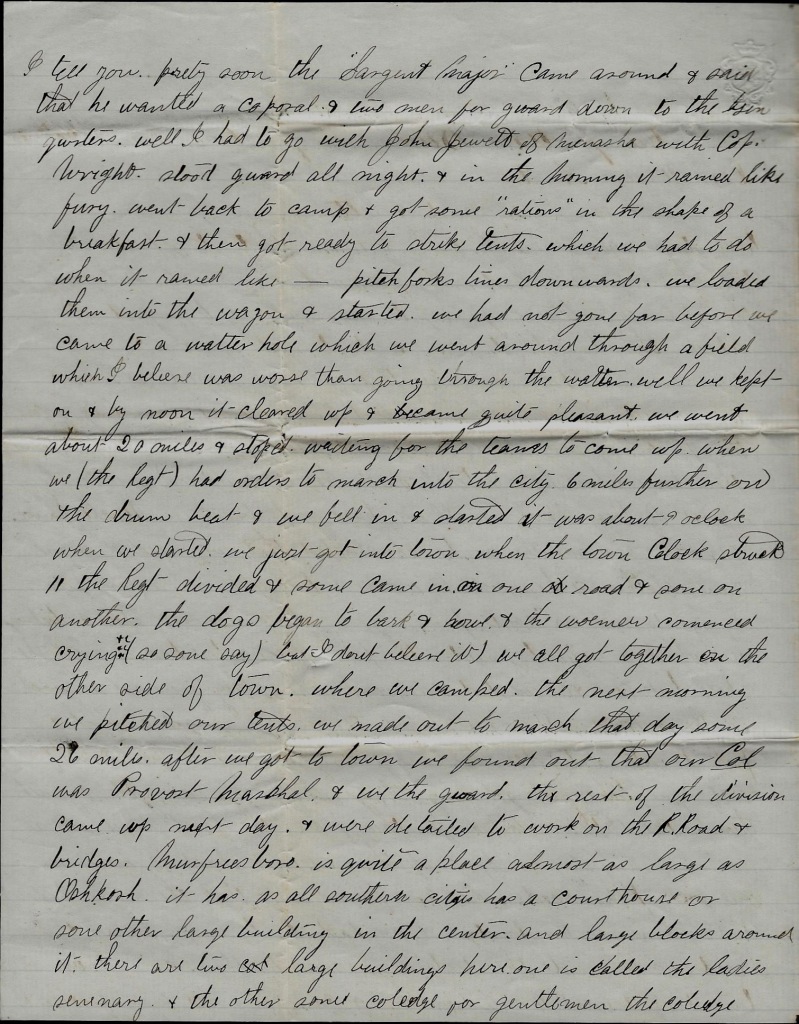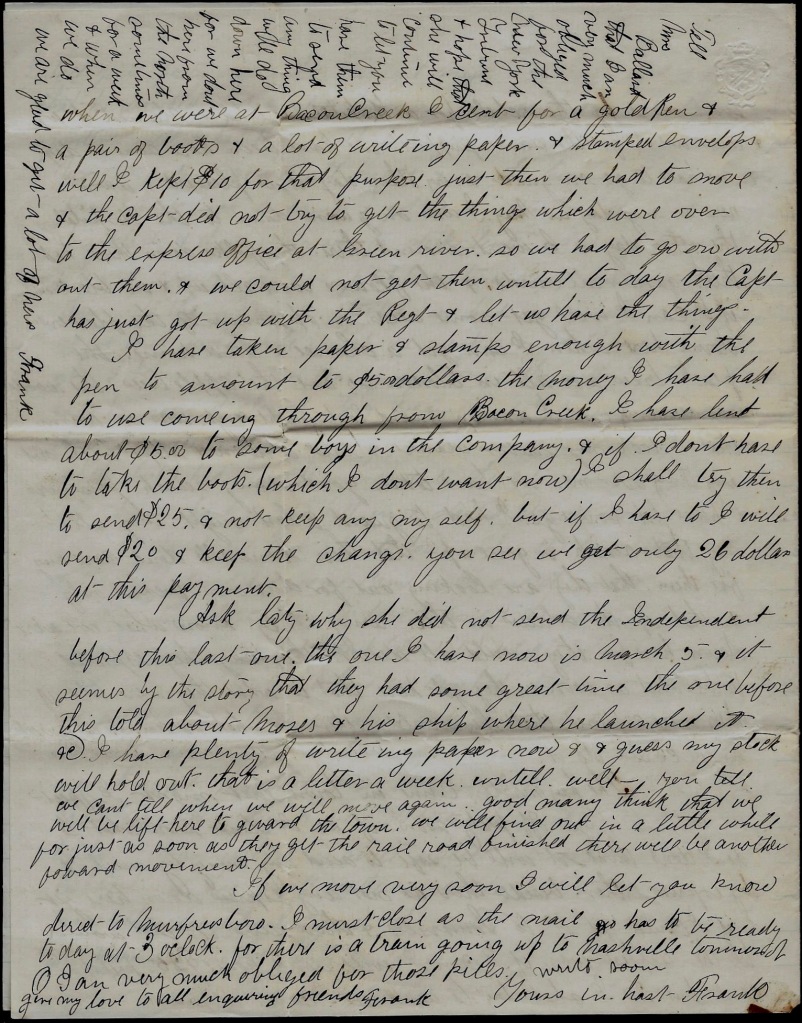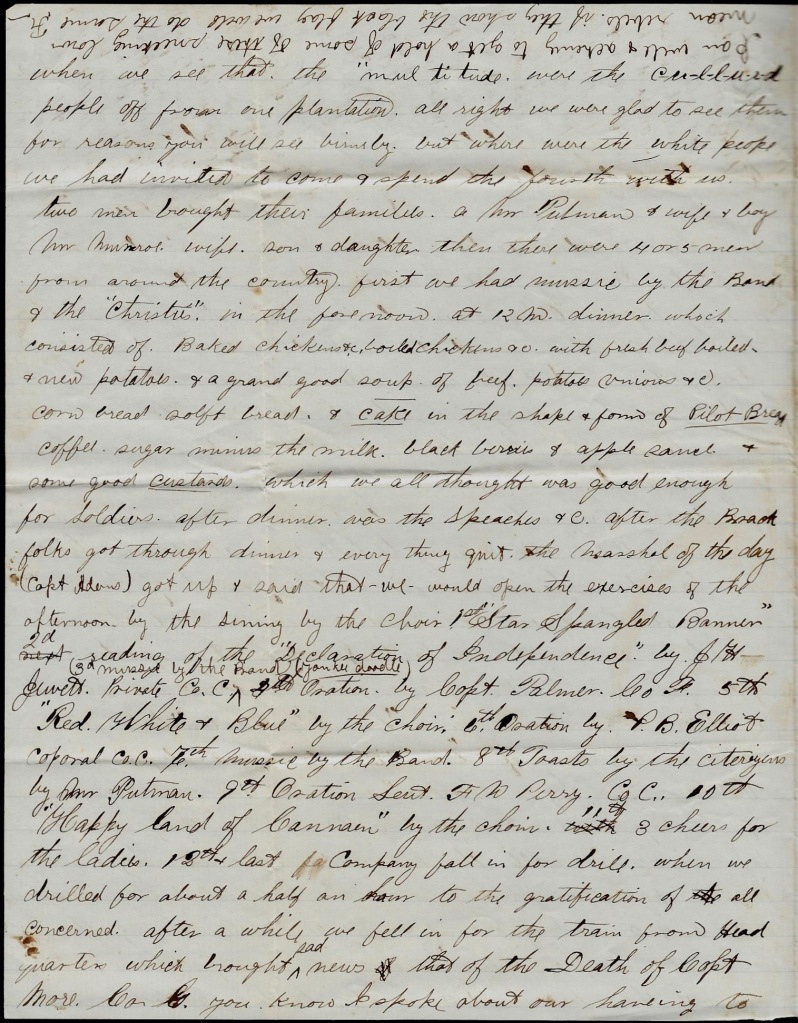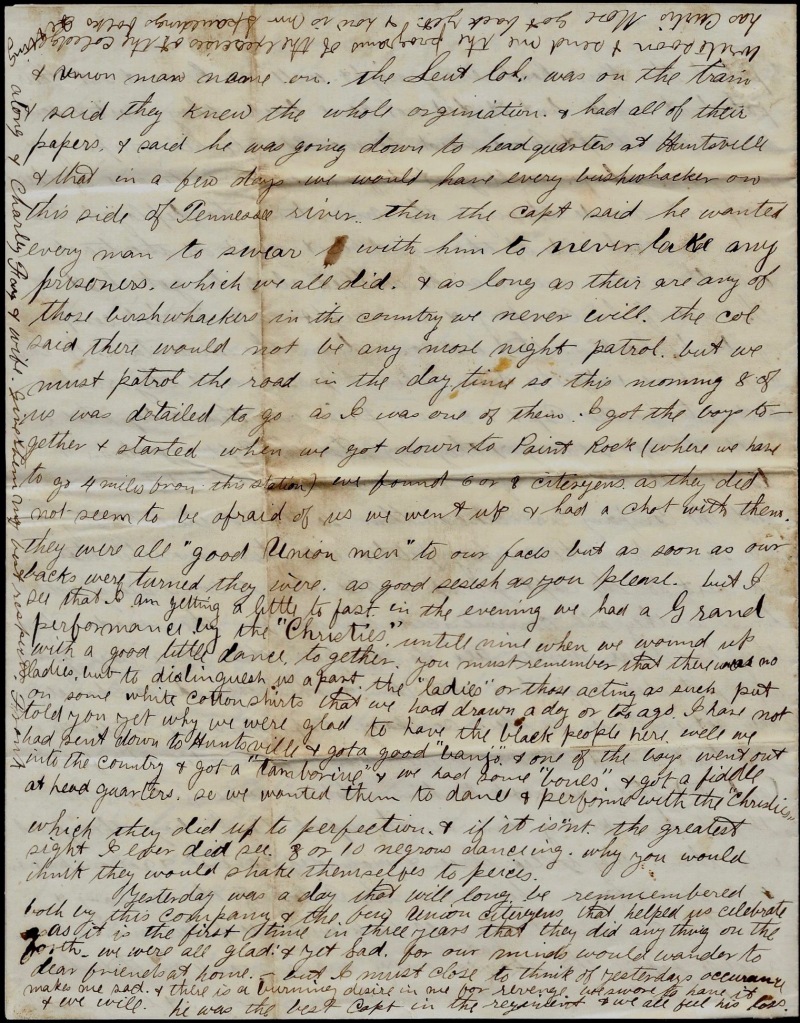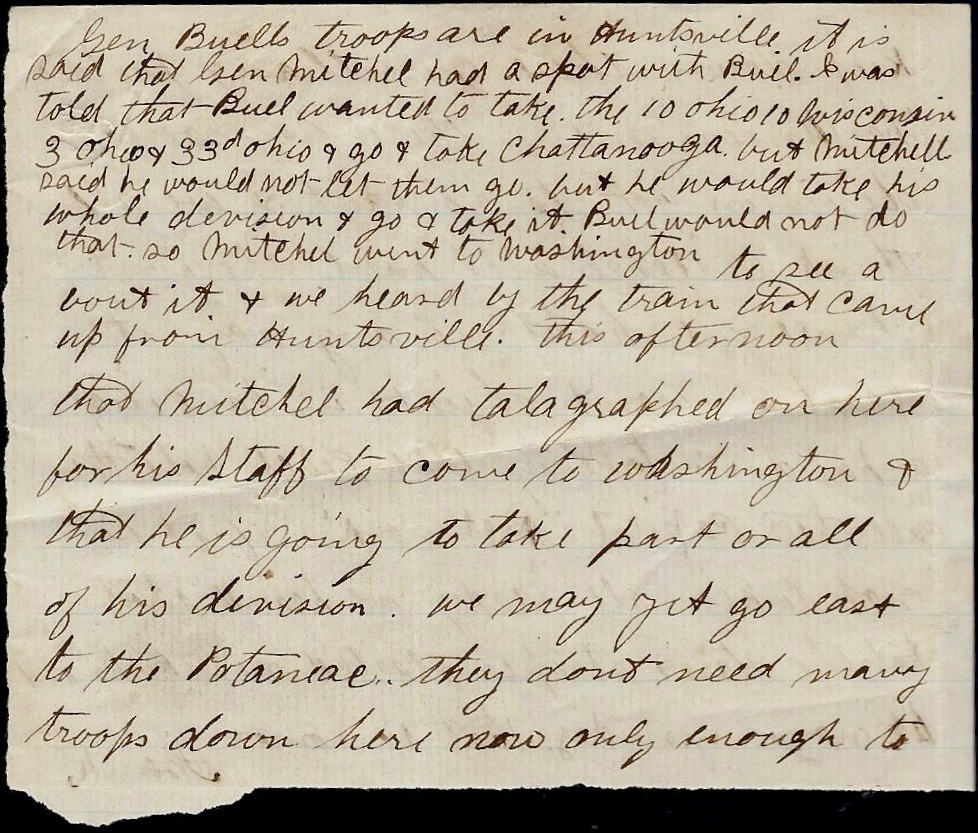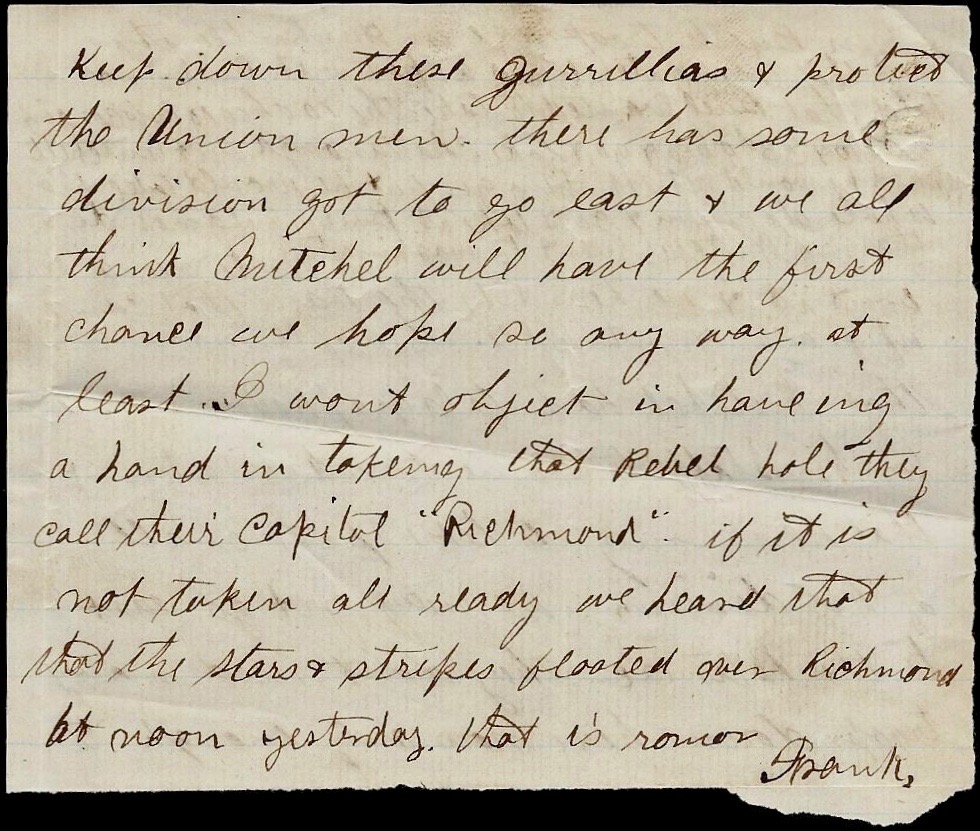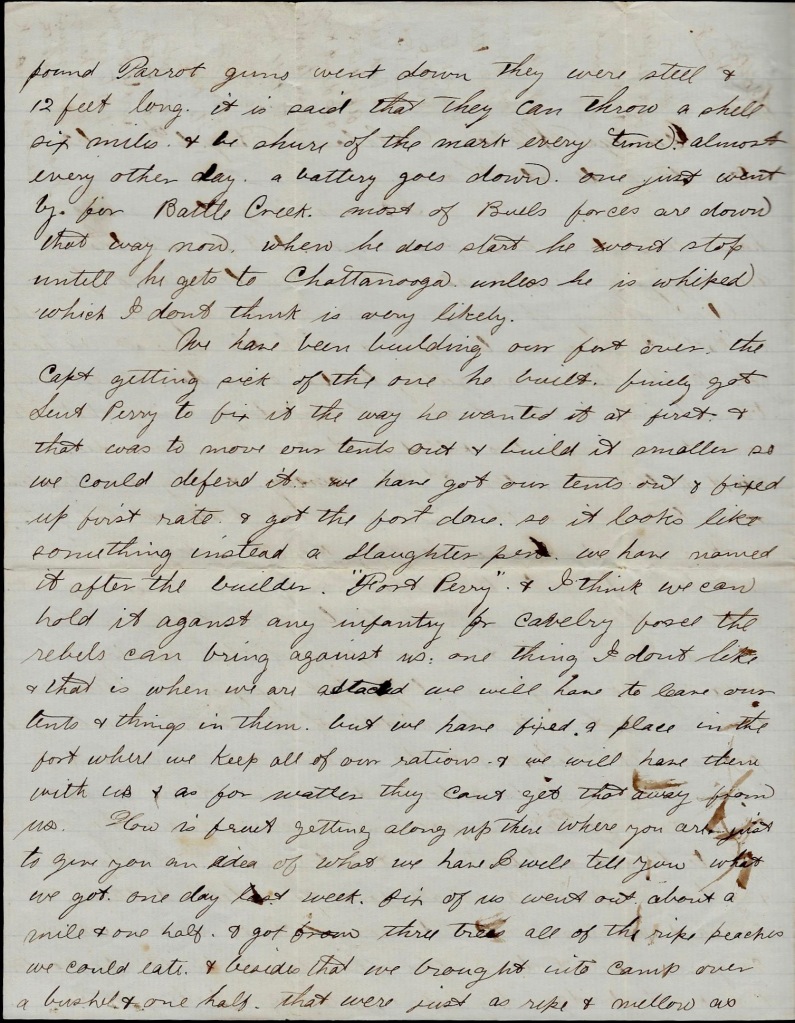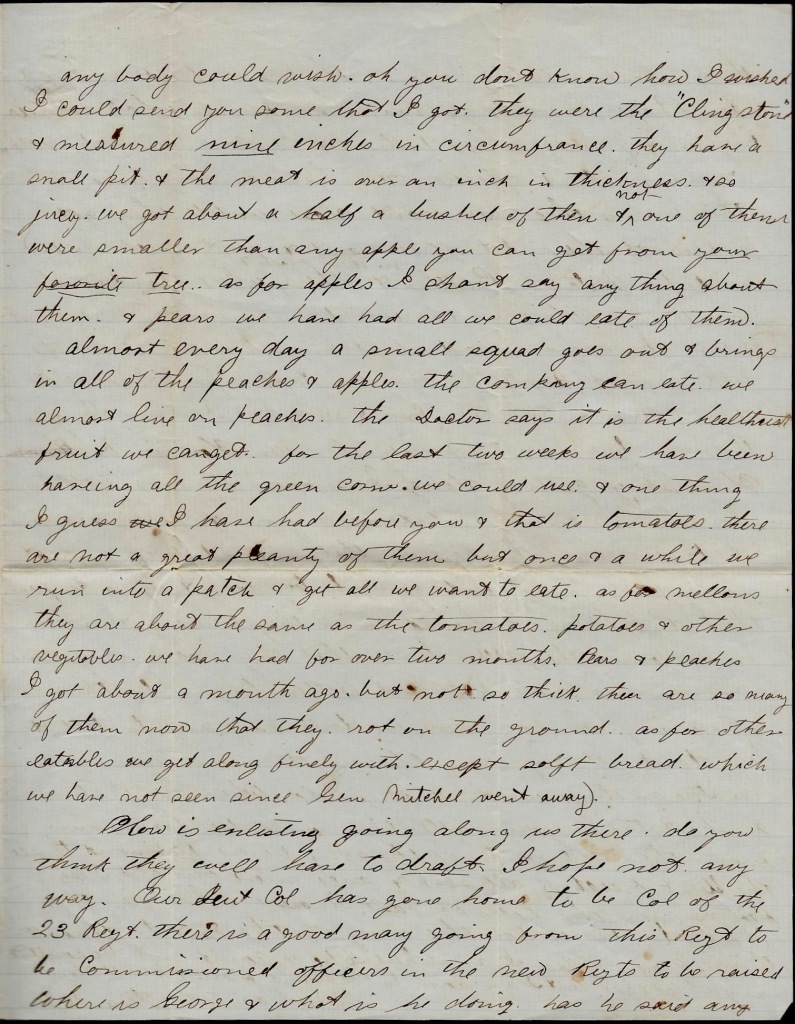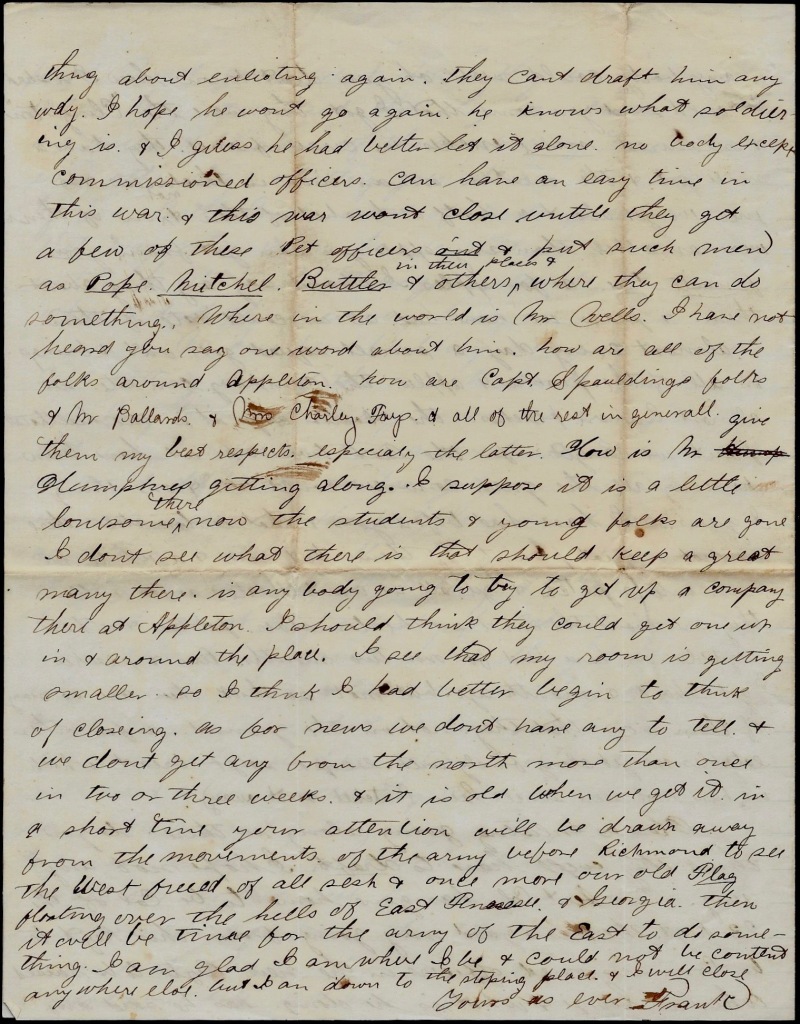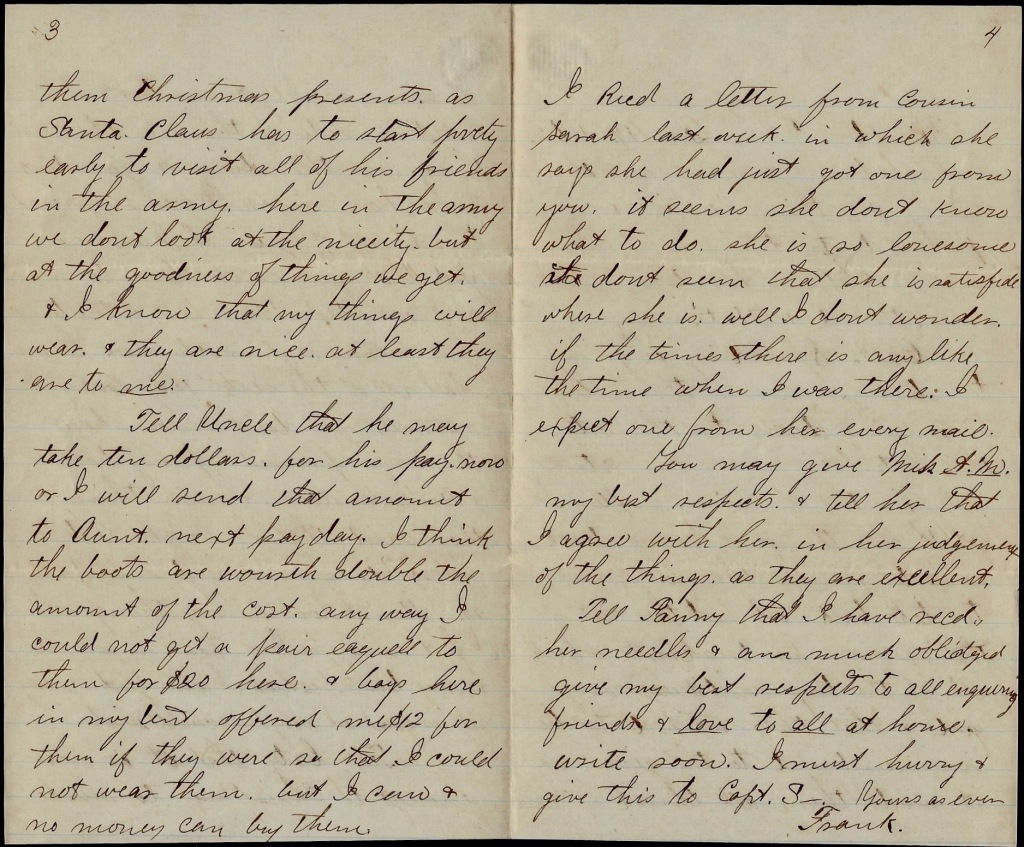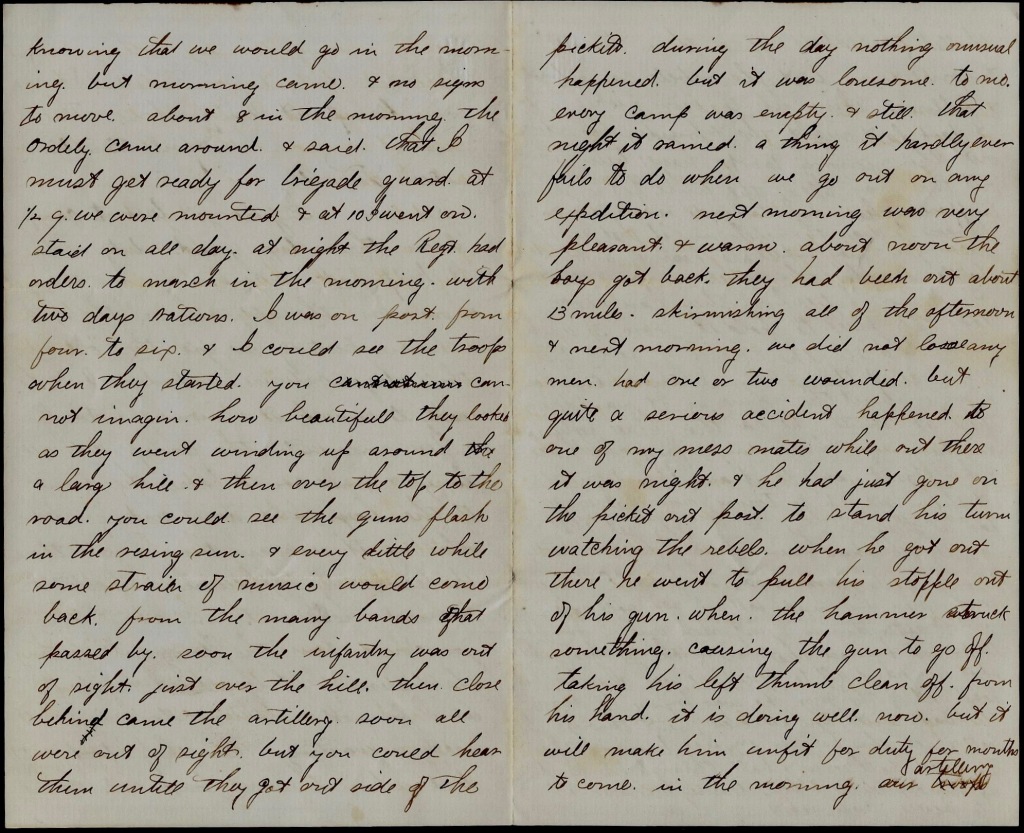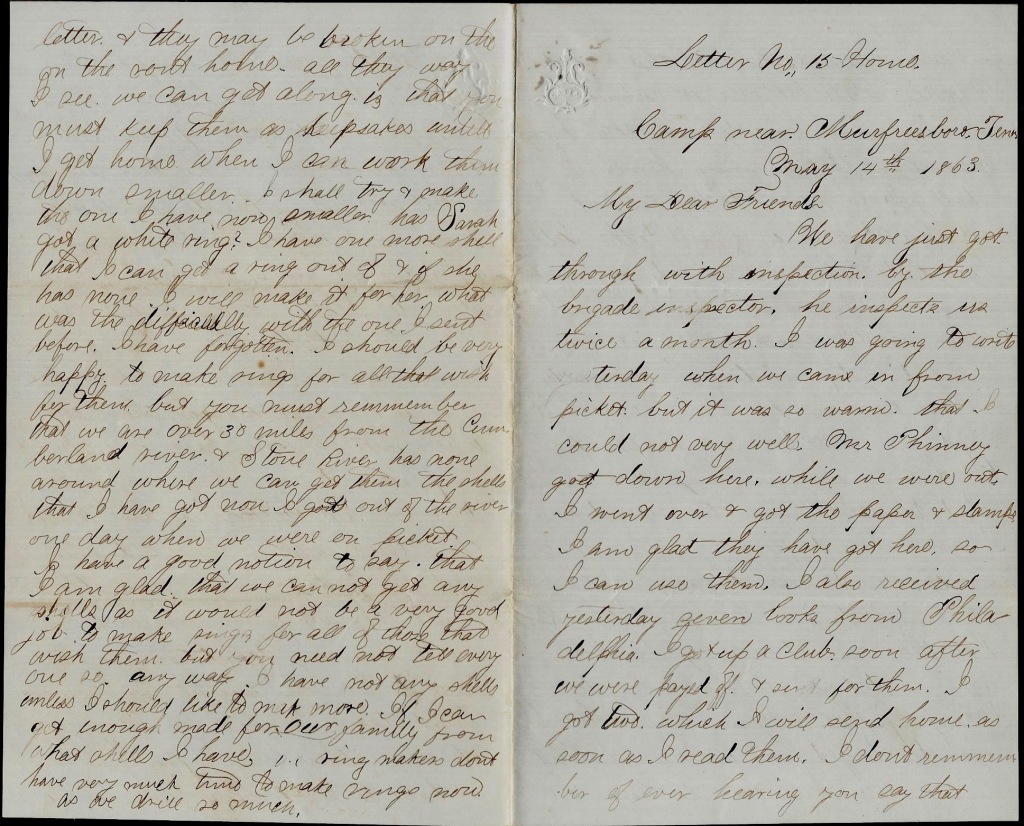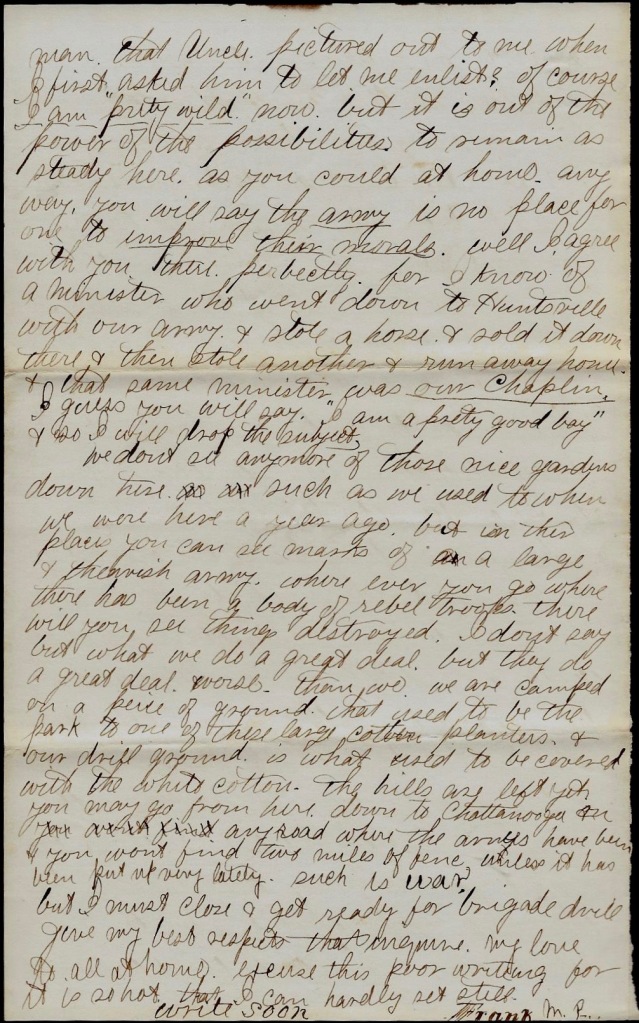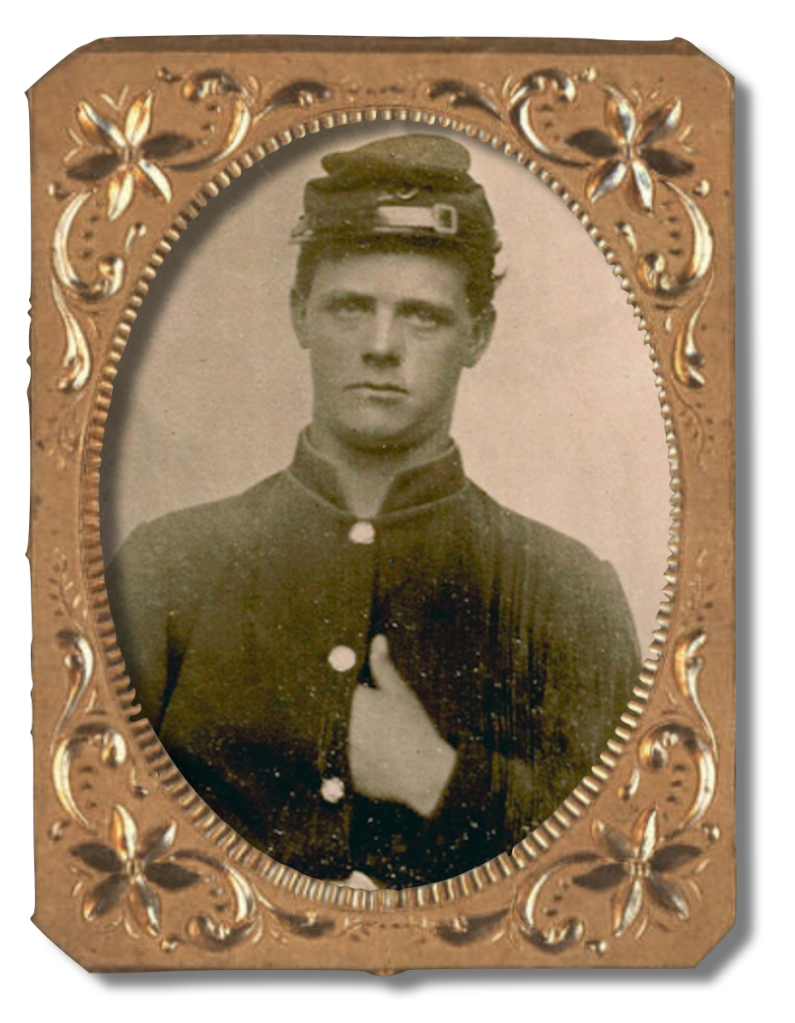
These letters were written by Frank M. Phelps of Menasha, Wisconsin, who served in Co. C, 10th Wisconsin Infantry, between March 1862 and May 1863. During this time, Phelps and his regiment occupied different areas around both Murfreesboro and Huntsville, where he participated in the capture of that city, as well as the Battles of Perryville and Stone’s River. His letters are addressed generally to his friends and family at home in Appleton, Wisconsin, and he shares with them several remarkable details about his experiences in the South, including an ambush by bushwhackers in Alabama.
On March 30, 1862, six months after his enlistment as a private, Phelps writes from Camp Van Buren in Murfreesboro. He describes the march into the city, paying particular attention to horticultural details: “The folks down there had their gardens all made & the flowers were all up in blossom. If I can I will get some seeds or specimens of the flowers down here when I can get a chance & send home. The peach trees are in blossom; so are the apple trees.” He also discusses a recent stint on guard duty, where he was responsible for eight Confederate prisoners, who “expected to be shot as soon as they got here. That is what they were told, if they were captured that they would either be shot or hung as quickly as we could do it.”
Later that summer, Phelps recounts a festive Fourth of July celebration in Gurley, Alabama, attended by several locals including “a multitude [of] the cullurd [sic] people off from one plantation.” He records a program of the entertainment, including speeches, toasts, music, and dancing, as well as a detailed menu, noting that it “was a day that will long be remembered by both this company & the few Union citizens that helped us celebrate as it is the first time in three years that they did anything on the fourth.”
The following year, while encamped near Murfreesboro, Phelps writes on April 23 of a series of skirmishes that, while uneventful, seem to be part of General William Rosecrans’s overarching strategy: “It is generally supposed that our brigade went out on purpose to draw the Rebels on. If that is the case, you may expect to hear of a bloody battle. . . I think ‘Old Rose’s’ plan is about the same as it was down there at Corinth. He has this place fortified on the same plan as he had that place & his object is to draw them on & let them get up to town but that is as far as they can go & if they get that far it will be sure death.”
In his next letter, dated May 5, 1863, Phelps tells of a visit to the surrounding forts and describes the different guns he sees at each location, writing in part: “We found 16 guns mounted in this [fort]. It is not finished yet. I will describe only one gun & let you imagine the rest. This one is a siege howitzer. The gun is about six feet long, 28 in. in diameter at the muzzle. The bore is 8 in. so the thickness of the iron is 10 inches. At the breach it is about 3 feet in diameter. It will throw a solid shot weighing 64 lbs over four miles. . . they are not very nice things to get shot with.”
Phelps was discharged in March of 1864 but either reenlisted or was transferred to the 38th Wisconsin as a second lieutenant. He was promoted to the rank of first lieutenant on September 6, 1864 and mustered out the following July in Washington, D.C.
Letter 1
[Note: The following transcript of the 18 February 1862 letter was published in “Manuscripts & Folklife Archives, Kentucky Library & Museum, Western Kentucky University.]
Bowling Green [Kentucky]
February 18, 1862
Dear Uncle,
I received a letter from you & Aunt the 10th of this month and was going to answer it but about midnight the long roll beat over at headquarters and the Colonel put over there in double quick and while he was gone, the other regiments were cheering. We did not know what was going on. But in a little while the Colonel came back and said we had marching orders to start at daybreak so we cooked out two days rations and started and reached Green River at noon but did not cross over until afternoon. We stopped there a day. Munfordsville is a pretty place—not very large. We passed the 1st West Virginia—they were on the other side of the river but I could not cross to see them.
The next day we had orders to march so we packed up things and started through the woods where no Union troops had ever been before and, by the way, our brigade was the first Union troops that had encamped on this side of the river. We had not gone far before we came up to the battleground where they had a fight some two or three weeks ago. I saw the horse that the Colonel of the Texas Rangers rode and a good many others that were killed. Some of our boys found nice revolvers that they lost when they run so.
Well we kept on and we had not gone far when we came to a pond of water with two or three dead horses in it. We we went on and in about half a mile there was another pond with some more horses in it and so it was for about 15 miles. Just before we started, we had orders for every man to have his canteen filled with water and not to touch any on the way. We went about 19 miles that day and stopped and pitched tents, went to bed, &c. In the night it snowed a little. The next morning we got up and struck our tents & started for Bowling Green. If we could reach it, we meant too.
We went about eight miles and halted and rested and took a little grub & before we started, the brigade ahead of us put off on the double quick with the cavalry and then we started on a brisk walk. Before we had gone far, the news passed down the ranks that our batteries were shelling Bowling Green. With a long cheer, we put off on a double quick—or the next thing to it—to reinforce them. In a little while, an artilleryman went by us after the reserve magazines which came thundering by us as far as they could go. Well we reached the river at dark, having by a forced march traveled 25 miles. We camped there over night (Co. A & B were sent out as picket guards the night before) and the next morning we started without knapsacks and tents to cross the river but we did not cross as the town gave up without our having to load muskets. So we came back and fixed up our tent but I was ordered to Gen. Mitchel’s Headquarters to guard close by. There is a strong fort which would mount between 20 or 30 guns of the heaviest kind.
During the next day the regiment or our brigade crossed over the river when we came over. I got my breakfast when I went over town. The first place I came to was the depot and engine house all burnt up and destroyed. One of our batteries got here at eleven o’clock (Armstrongs) and commenced shelling them. They set the depot afire and knocked an engine to pieces that they were hauling off their things with. In the depot and around it there were guns, kettles, pork and everything that you can think of that was burnt—over $2,000,000 worth of stuff was destroyed. I was told by a man that was in the building when the first shell was thrown over that there were between 2 and 3,000 Rebels in town and Gen. Hardee was in the Express office reading dispatches from Buckner. He then run up to the fort on Cllege Hill where Johnson was and both with glasses saw us pouring in. They called their troops & run as fast as they could after setting fire to about 100 tins of salt pork. The streets are full of sugar, salt beef, and pork flour, and everything else. If you see anything about the rebels starving, don’t you believe it. One thing they have not got & that is coffee. They use thy and barley.
Before you get this you will hear the news of the “Capture of the stronghold of the rebels” without loading a musket. They burnt guns of the best kind, five or six engines, and part of the town. They had this place fortified very strong and if they stayed here we could not have taken it without losing a great many lives.
When we were coming from Green River, one of the citizens told me the reason why thy put poisoned horses in the ponds was that they expected to meet us there and have a fight and then we could not get any water. They fell trees into the road for miles and even plowed it up. The railroads was destroyed for only four miles in a few other places.
It is rumored that they are fighting at Nashville. I heard Gen. Mitchel say that he was going to push ahead and go to Nashville. He said that was his place. They are building the bridge and are going to commence work on the RR bridge pretty soon. We expect to march tomorrow.
The sheet of paper the boys captured of secesh. I had a Nashville paper that I was going to send but I lost it over in town. I did not have any other. Mud is 8 inches deep here. The last fifteen miles we came, we never stopped once and we were on the double quick most of the way. I tell you, we were pretty tired. One man said he wished we got here four hours sooner and we would have saved most of the property here. If you get one of the Illustrated papers, you will see diagrams of the forts and city as there was a reporter here drawing & sketching the place.
I must close. Write soon and direct to Frank Phelps, 10th Wisconsin Volunteers, Bowling Green, via Louisville.
Yours in haste, — Frank
P. S. We just captured a Secesh captain. He was in town in disguise. We have him in close quarters.
Letter 2
Camp Van Buren
Murfreesboro, [Tennessee]
March 30, 1862
Dear Uncle & Aunt,
I received a letter from you one or two days ago of March 20th & I was glad to get it, I can tell you, for we had not received any mail—only when the Division teams go up to Nashville & bring it down, which they have to do every week to get provisions.
Well you see that we have moved as I said we would in my last in a short time. We got marching orders the 17th. It was very warm and we had packed our overcoats to send them home when Gen. Mitchel said that we could not until the first of April. We have just been in Uncle Sam’s service six months so he concluded that we needed some new clothes & he went to work and brought on a large pile of goods such as coats, pants, caps, shirts, drawers, shoes & stockings &c. which a soger boy needs. The pants we wanted bad as with the shoes, but coats &c. we did not want where they were not as good as the ones we had. So we shipped them back. I got a shirt & put it into a bundle that George Wright sent to Jim Dewolf & if you have not got my things there, you can get it with them.
The 18th we started for this place. The first day it was as warm as any day in April up there. We went about 13 miles on one pike road when we found out that the rebels had destroyed all of the bridges and we had to turn off on another road which made the distance 14 miles further around. We turned off and went 4 miles further and camped, all pretty foot sore, I tell you. Pretty soon the Sergeant Major came around and said that he wanted a corporal and two men for guard down to the Gen. quarters. Well I had to go with John Jewett of Menasha with Corp. Wright. Stood guard all night and in the morning it rained like fury. Went back to camp & got some rations in the shape of a breakfast & then got ready to strike tents which we had to do when it rained like pitchfork tines downwards.
We loaded them into the wagon & started. We had not gone far before we came to a water hole which we went around through a field which I believe was worse than going through the water. Well we kept on and by noon it cleared up and became quite pleasant. We went about 20 miles and stopped, waiting for the teams to come up when we (the regiment) had orders to march into the city 6 miles further on.
The drum beat & we fell in and started. It was about 9 o’clock when we started. We just got into town when the town clock struck 11. The regiment divided and some come in one road & some another. The digs began to bark and howl & the women commenced crying (so some say but I don’t believe it). We all got together on the other side of town where we camped. The next morning we pitched our tents. We made out to march that day some 26 miles. After we got to town we found out that our Colonel was Provost Marshal and we the guard. The rest of the Division come up next day & we were detailed to work on the railroad and bridges.
Murfreesboro is quite a place—almost as large as Oshkosh. It has, as all southern cities, a courthouse or some other large building in the center, and large blocks around it. There are two large buildings here. One is called the Ladies Seminary and the other some college for gentlemen. The college was used by the reels for a hospital. We have cleaned it up and now use it for the same purpose.
We have been her some 10 days and we have to go on guard every other day. It is pleasant and warm here as any day in May. I was on guard down to the hospital the other day and I went around there. The folks down there had their gardens all made & the flowers were all up and is blossom. If I can, I will get some seeds or specimens of the flowers down here when I can get a chance & send home. The peach trees are all in bloom. So are the apple trees. The woods are leafing out.
I was on guard last night and it was so warm that I took my rubber blanket and laid it down & slept without anything over me. We have taken good many secesh prisoners and have let some go. I had to guard 8 last night. They all say that secesh is gone up—that their generals don’t care any for them—that they are looking out for their own pockets only, and that if the soldiers in their army only knew what we were down here for they would all desert. They say they expected to be shot as soon as they got here. That is what they were told if they were captured—that they would either be shot or hung as quick as we could do it.
The paymaster came in town last night. I expect we will be paid off pretty soon. If so, I don’t know what to do. I don’t think it will be safe to send any money by mail & by express either. Besides, there is not any express down here yet. If I could get it to Louisville and then send it, that would be the safest way. If I can, I will send home $25. Perhaps I can’t but 20. I shall try to send all I can anyway.
When we were at Bacon Creek, I sent for a gold pen and a pair of boots & a lot of writing paper & stamped envelopes. Well I kept $10 for that purpose. Just then we had to move and the captain did not try to get the things which were over to the express office at Green river, so we had to fo on without them & we could not get them until today. The captain has just got up with the regiment and let us have the things.
I have taken paper and stamps enough with the pen to amount to $5 dollars. The money I have had to use coming through from Bacon Creek. I have lent about $5 to some boys in the company and if I don’t have to take the boots (which I don’t want now) I shall try then to send $25 and not keep any myself. But if I have to, I will send $20 and keep the change. You see we get only 26 dollars at this payment.
Ask Lotty why she did not send the Independent before this last one I have now is March 5 & t seems by the story that they had some great time the one before. This told about Moses and his ship, where he launched it, &c. I have plenty of writing paper now and I guess my stock will hold out. That is a letter a week. We can’t tell when we will move again. A good many think that we will be left here to guard the town. We will find out in a little while for just as soon as they get the railroad finished, there will be another forward movement.
If we move very soon, I will let you know. Direct to Murfreesboro. I must close as the mail has to be ready today at 3 o’clock for there is a train going up to Nashville tomorrow. Oh, I am very much obliged for those pills. Write soon. Give my love to all enquiring friends. Yours in haste, — Frank
Letter 3
Gurley’s Station
July 5, 1862
Dear Friends at Home,
Since my last. letter home we have had exciting times here in a good many respects. In my last I spoke about sending our money by an Ohio man. But since then the Colonel has changed his mind and concluded to send it by Doctor Revies, Asst. Surgeon, who was sent with us by the state & got no pay from Uncle Sam. As the Colonel wanted him to go, he thought he would. The doctor is from Green Bay and is to leave the money at Mr. Bates’. I have paid all charges here so I don’t think there will be any more.
Well I was going to tell you about what times we have been having. Well, as the Fourth of July was nigh at hand, we concluded we could celebrate as much as we could, so last Sunday at inspection, we appointed a committee of arrangements. Then we got up a choir to which your humble writer belonged. Also a company of “Christies” [black face performers]. The captain dropped a hint that geese, turkey, and chickens were needed so when any of the boys went out a scouting, the needed things were sure to come along. Well they had come and we were ready and waiting for the expected company to come. About 10 ‘clock they commenced to come & onlooking around and see the families coming, the women dressed up in their Sunday go to meeting calico, & the men with their best on. But we stop to look & look again when we see that the multitude were the c-u-l-l-u-r-d people off from one plantation. All right, we were glad to see them for reasons you will see briefly. But where were the white people we had invited to come and spend the Fourth with us. Two men brought their families—a Mr. Pulman and wife and boy, [and] Mr. Munroe, wife, son and daughter. Then there were 4 or 5 men from around the country.
First we had music by the band & the Christies in the forenoon. At 12 M. [we had] dinner which consisted of baked chicken, boiled chickens, &c. with fresh beef boiled, and new potatoes, and a grand soup of beef, potatoes, onions, &c., cornbread, soft bread, and cake in the shape and form of Pilot bread, coffee, sugar, minus the milk, blackberries, and apple sauce and some good custards which we all thought was good enough for soldiers. After dinner was the speeches, &c. After the black folks got through dinner and everything quiet, the marshal of the day (Capt. Adams) got up and said that we would open the exercises of the afternoon by the singing by the choir 1st, Star Spangled Banner; 2nd, reading of the Declaration of Independence by J. H. Jewett, private Co. C; 3rd, Music by the band, Yankee Doodle; 4th, Oration by Capt. Palmer, Co. F; 5th, Red, White & Blue by the choir; 6th, Oration by P. B. Elliott, corporal Co. C; 7th, Music by the band; 8th, Toasts by the citizens by Mr. Putnam; 9th, Oration Lieut. F. W. Perry, Co. C; 10th, Happy Land of Canaan by the choir; 11th, 3 Cheers for the Ladies; 12th & last, company fall in for drill when we drilled for about a half an hour to the gratification of all concerned. After awhile we fell in for the train from headquarters which brought sad news—that of the death of Capt. [William] Moore, Co. G.
You know I spoke about our having to patrol the railroad every night. Well Co. G sent out their patrol at night but it did not come back. They waited some time when Capt. Moore said he would take his company and go and get the boys. Well just before he came to one of these deep cuts made through the mountain, he deployed his man on each side of the road but kept on the track with three other men. As he walked along, he got ahead of his company and run right into a whole company of bushwhackers that had come down the mountain to this cut to fire into the train when it passed. Well they rushed out and took the Captain and 3 men prisoners. The three boys that were with the captain got away & they say that the captain sat down and talked with the secesh for some time. The rebels did not expect that the company was close on them so they sat there waiting for the train when the company pitched into them. One rebel that was next to the captain got up and told him to come along with him as they all commenced to run for the woods where they had their horses toed to the trees. These three boys got up and pretended to go along with them and they they saw a chance, they got away over to their company. Capt. Moore sat still on the track and said he would not stir a bit when this fellow (or brute) that was next to him shot a charge of buck shot through him, killing him on the spot.
Co. G boys then piled into them. They killed three & wounded several and got one prisoner with 8 good horses. They killed the Orderly of the company & on him they found the roll book with all their names and lots of papers that every man’s name on that had harbored them or gave them any money or horses & every secesh and Union man’s name on. The Lieut. Col. was on the train & said they knew the whole organization & had all of their papers & said he was going down to headquarters at Huntsville & that in a few days we would have every bushwhacker on this side of the Tennessee river. Then the captain said he wanted every man to swear to him to never take any prisoners, which we all did. And as long as there are any of those bushwhackers in the country, we never will.
The Colonel said there would not be any more night patrol but we must patrol the road in the daytime so this morning 8 of us was detailed to go. As I was one one of them, I got the boys together and started. When we got down to Point Rock (where we have to go 4 miles from this station) we found 6 or 8 citizens. As they did not seem to be afraid of us, we went up and had a chat with them. They were all good Union men to our faces but as soon as our backs were turned, they were as good secesh as you please. But I see that I am getting a little too fast. In the evening we had a grand performance by the Christies until nine when we wound up with a good little dance together. You must remember that there was no ladies but to distinguish us apart, the “ladies”—or those acting as such—put on some white cotton shirts that we had drawn a day or two ago. I have not told you why we were glad to have the black people here. Well we had send down to Huntsville and got a good banjo and one of the boys went out into the country and got a tambourine and we had some bones and got a fiddle at headquarters, so we wanted them to dance and perform with the Christies which they did up to perfection and if it isn’t the greatest sight I ever did see—8 or 10 negroes dancing. Why you would think they would shake themselves to pieces.
Yesterday was a day that will ing be remembered both by this company and the few Union citizens that helped us celebrate as it is the first time in three years that they anything on the Fourth. We were all glad and yet sad for our minds would wander to dear friends at home.
But I must close. To think of yesterday’s occurrence makes me sad & there is a burning desire in me for revenge. We swore to have it and we will. He was the best captain in the regiment & we all feel his loss. Write soon and send me the programs of the exercises at the college. Has Curtis Moore got back yet? And how id Mr. Spaulding’s folks getting along? And Charley Fox and wife? Give them my best respects. — Frank
But I must tell you what I got coming back from Point Rock. About a mile this side we saw an orchard when we went up & we thought we would go over and see what we could find & we did find just what we wanted. I got all the ripe pears and apples that I could eat and by buckling my belt around me tight & then open my coat, I had a good sack which I filled & brought them to camp. I earned them, I tell you, by the way I suffered walking in the hot sun. Give my best respects to all enquiring friends & accept this from your soldier nephew, — Frank Phelps
Gen. Buell’s troops are sin Huntsville. It is said that Gen, Mirtchel had a spat with Buell. I was told that Buell wanted to take the 10th Ohio, 10th Wisconsin, 3rd Ohio, & 33rd Ohio and go and take Chattanooga but Mitchell said he would not let them go but he would take his whole division & go and take it. Buell would not do that so Mitchell went to Washington to see about it and we heard by the train that came up from Huntsville this afternoon that Mitchell had telegraphed on here for his staff to come to Washington and that he is going to take part or all of his division. We may yet go east to the Potomac. They don’t need many troops down here now—only enough to keep down these guerrillas and protect the Union me. There has some division got to go East and we all think Mitchell will have the first chance. We hope so anyway at least. I won’t object in having a hand in taking that Rebel hole they call their capitol, Richmond—if it is not taken already. We heard that the stars and stripes floated over Richmond at noon yesterday. That is rumor. — Frank
Letter 4
Gurley’s Station, Alabama
August 6th, 1862
Dear Friends at Home,
It is a long time since I have received a letter from you but for all that, I am enjoying myself as well as can be expected for a soldier, Nothing especial going on. Work going on as steadily at “Battle Creek” as can be expected with the General we have got. Bushwhackers are getting bolder every day. Almost every Tain brings news of some of our boys being shot into, sometimes one or two killed and three or four wounded. Most of this is in the 3rd Ohio Cavalry & they are threatening to cross over the river in several places.
We had quite a skirmish at Hunter’s Landing the other day. I have not been down to Bridgeport only once since my last and then the rebels seemed to be quite thick on the island. I saw about a company of their cavalry & infantry. Some of our boys took a paper in their mouth and swam out unto the middle of the river & exchanged papers with them; one of the secesh coming out to him. There will be a forward movement in a short time. Our forces are pressing in every negro they can get to build fortifications at Stevenson, Bridgeport, and other places so a small force can defend them and forward provisions on.
A regiment of mechanics and engineers went down the other day to build the pontoons and make the bridge. Day before yesterday a battery of 24-pound Parrot guns went down. They were steel and 12 feet long. It is said they can throw a shell six miles & be sure of the mark every time. Almost every other day a battery goes down. One just went by for Battle Creek. Most of Buell’s forces are down that way now. When he does start, he won’t stop until he gets to Chattanooga unless he is whipped which I don’t think is very likely.
We have been building our fort over, the captain getting sick of the one he built. Finally got Lieut. Perry to fix it the way he wanted it at first & that was to move our tents out and build it smaller so we could defend it. We have got our tents out and fixed up first rate & got the fort done so it looks like something instead of a slaughter pen. We have named it after the builder, “Fort Perry” and I think we can hold it against any infantry or cavalry force the rebels can bring against us. One thing I don’t like and that is when we are attacked, we will have to leave our tents and things in them But we have fixed a place in the fort where we keep all of our rations and we will have them with us. And as for water, they can’t get that away from us.
How is fruit getting along up there where you are? Just to give you an idea of what we got, one day last week, six of us went out about a mile and one half and got from three trees all of the ripe peaches we could eat and besides that, we brought into camp over a bushel and one half that were just as ripe and mellow as anybody could wish. Oh you don’t know how I wished I could send you some that I got. They were the “Clingstone” and measured nine inches in circumference. They have a small pit and the meat is over an inch in thickness & so juicy. We got about a half bushel of them and not one of them were smaller than any apple you can get from your favorite tree. As for apples, I shan’t say anything about them, & pears we have had all we could late of them.
Almost every day a small squad goes out and brings in all of the peaches and apples the company can eat. We almost live on peaches. The Doctor says it is the healthiest fruit we can get. For the last two weeks we have been having all the green corn we could use & one thing I guess I have had before you and that is tomatoes. There are not a great plenty of them but once in awhile we run into a patch and get all we want to eat. As for melons, they are about the same as the tomatoes, potatoes and other vegetables. We have had for over two months. Peas and peaches I got about a month ago, but not so thick. There are so many of them now that they rot on the ground. As for other eatables, we get along finely with the exception of self bread which we have not seen since Gen. Mitchell went away.
How is enlisting going along up there? Do you think they will have to draft? I hope not anyway. Our Lieut. Colonel has gone back home o be Colonel of the 23rd Regiment. There is a good many going from this regiment to be commissioned officers in the new regiments to be raised. Where is George and what is he doing? Has he said anything about enlisting again? They can’t draft him anyway. I hope he won’t go again. He knows what soldiering is & I guess he had better let it alone. Nobody expect commissioned officers can have an easy time in this war & this war won’t close until they get a few of these Pet officers out and put in such new men as Pope, Mitchell, Butler and others in their places where they can do something.
Where in the world is Mr. Wells? I have not heard you say one word about him. How are all of the folks around Appleton? How are Capt. Spaulding’s folks and Mr. Bullard’s? And Mrs. Charley Fay’s and all the rest in general? Give them my best respects—especially the latter. How is Mr. Humphreys getting along? I suppose it is a little lonesome there now with the students and young folks all gone. I don’t see what there is that should keep a great many there. Is anybody going to try to get up a company there at Appleton? I should think they could get one up in and around the place.
I see that my room is getting smaller so I think I had better begin to think of closing. As for news, we don’t have any to tell and we don’t get any from the North more than once in two or three weeks and it is old when we get it. In a short time your attention will be drawn away from the movements of the army before Richmond to see the West freed of all secesh and once more our old flag floating over the hills of East Tennessee & Georgia. Then it will be time for the Army of the East to do something. I am glad I am where I be. I could not be contented anywhere else. But I am down to my stopping place and I will close. Yours as ever, — Frank
Letter 5

Camp Andy Johnston
December 14, 1862
Dear Friend at Home,
You may hear of a soldier’s heart made to rejoice. Now I know of one whose heart was made to rejoice by receiving a lot of goodies from home & useful articles. Yesterday afternoon I got a pass with two other of my tent mates to go over to the 21st Regiment. When we got over there, they were having brigade drill after brigade inspection. They soon came in & I was visiting with James when one of our boys (our regiment) told me that there was a captain that wanted to see me so I went down towards Co. D. On the way I met Capt. Stebbins of the 24th Illinois. He was home a short time ago. When I got to the company, there was a crowd around Lieut. Turner’s tent so I did not go there but after seeing the boys, I went up to see Mr. Fuller. He was not there but in a few minutes he came up with a letter, a box, and roll for me. Of course the letter was the first thing to open and in there I found out what was in the box. Then I went down & saw Capt. Spaulding and he said that there was a pair of boots & some socks and mittens in another box for me which would be there that night.
I intend to go over there today if we don’t move as we just got orders to have two days rations in our haversacks and everything packed except tents and ready to move in a moments notice so I must close and pack my things & then if I have time I will go move to the 21st. Goodbye, — Frank
Tuesday, December 16th 1862.
We have not moved yet but are yet under marching orders. I have not been over to the 21st yet to get the rest of my things, except Sunday I went over there. But Capt. Spaulding had gone to Nashville to see if he could get the things down here to us. I did not regret that I went over there as I got there just in time to hear Mr. Clinton preach the first sermon that I have heard except one was at Bacon Creek where our chaplain preached. I tell you, it seemed good to hear Mr. Clinton again. I wish that I could go and hear him every Sabbath.
I believe I did not tell you what I did with the eatables. They did not look so very nice but they were excellent. And now I will tell you why they did not look so very nice. Capt. Spaulding said that when he was in Louisville, he did not think that he could come through for some time so he thought that it would be the best thing for him to give all of the perishable things to the sick and wounded of Wisconsin that he could finds. But as got a pass, he did not give all of the eatables away but the bottom come out of the box that you sent to me and the things were all mashed up together except the butter and biscuit. The cakes and pies were all together so I cut it out in slices & gave a piece to each of my tent mates. Then I cut up the biscuit and gave each a piece with some butter. The latter made the mall think of home & they all agreed that that was Wisconsin butter and the pie was just like mothers & was so good. Next came the sausage for breakfast which they said was ruinous to the service as it makes us home sick. But never fear. And tell Mrs. Johnston that we all send her our thanks as all had some of it. There is enough of it left for breakfast tomorrow.
That maple sugar I gave a taste around and when it was gone, ew wished for more. I have got some butter left to eat with my hard bread which goes very well. I think that I will go over to the 21st tomorrow if we don’t move. We have been drawn up in line of battle to move any moment as a dispatch came in and said that they was fighting on ahead and we may move any time. The 28th Brigade went out on double quick this afternoon but I believe they came back. I hope we won’t go until I get those things. I just received those things you sent to me in October–the needless and paper. But I must close for tonight as the taps has beat.
Goodnight. — Frank
Wednesday morning December 17th, 1862. I have been over and got the rest of my things which were a pair of boots, two pair of socks, a pair of mittens, and a diary, some yarn, thread, and stationery.
Capt. Spaulding is going to start for home this afternoon. He is going down to the city this afternoon as he can start early in the morning. After I got my things, I came back so as to finish this for him to take back. We had the rest of that sausage for breakfast which all of the boys said it was very good & that they wished to be remembered to the giver and it made them all think of home. As soon as I got my boots, I looked inside of them & the first thing was the “diary” and you don’t know how much I was surprised to see all of you. Oh I am so glad that you sent them to me as I wanted them all of the time. Your pictures are worth more to me that all of the rest. The look so natural. You don’t know how the boys praised yo my boots & sock, mittens and everything. They said that I ought to be satisfied. & I am indeed perfectly so. After I looked my things over, I put on a pair of house made socks and my boots which I am glad to say fit as good as anyone could wish.
Tell Caty that it is near enough to Christmas to make them Christmas presents as Santa Claus has to start pretty early to visit all of his friends in the army. Here in the army we don’t look at the nicety but at the goodness of things we get & I know that my things will wear and they are nice—at least they are to me.
Tell Uncle that he may take ten dollars for his pay now or I will send that amount to Aunt next pay day. I think the boots are worth double the amount of the cost. Anyway, I could not get a pair equal to the them for $20 here & boys here in my tent offered me $12 for them if they were so that I could not wear them. But I can & no money can buy them.
I received a letter from cousin Sarah last week in which she says she had just got one from you. It seems she don’t know what to do. She is so lonesome it don’t seem that she is satisfied where she is. Well I don’t wonder if the time there is any like the time when I was there. I expect one from her every mail.
You may give Miss A. M. my best wishes and tell her that I agree with her in her judgement of the things as they are excellent. Tell Fanny that I have received her needles and am much obliged. Give my best respects to all enquiring friends and love to all at home. Write soon. I must hurry and give this to Capt. Spaulding. Yours as ever, — Frank
Letter 6
Camp at Murfreesboro, Tennessee
April 23, 1863
Dear Friends,
I just got back to camp from three days guard duty. How it happened? I can very soon let you know. On the afternoon of the 19th, all unexpectedly we go the “old order” three days rations in haversacks and be read to march at a moment’s notice. In a few minutes the camp was all busy & you could hear the hum of the boys who were asking each other if it was anything more than a scouting expedition or was it a forward movement. In about ten minutes you could hear the long roll beating in different brigades and regiments were formed on their color line, all ready and waiting. There they stood until dark when we went back into camp knowing that we would go in th morning. But morning came * no signs to move. About 8 in the morning, the Orderly came around and said that I must get ready for brigade guard. At 9:30 we were mounted & at 10, I went on [and] staid on all day. At night the regiment had orders to march in the morning with two days rations. I was on post from four to six & I could see the troops when they started. You cannot imagine how beautiful they looked as they went winding up around the large hill and then over the top to the road. You could see the guns flash in the rising sun and every little while some strike of music would come back from the many bands that passed by.
Soon the infantry was out of sight just over the hill. Then close behind came the artillery. Soon all were out of sight but you could hear them until they got outside of the picket. During the day nothing unusual happened but it was lonesome to me. Every camp was empty & still. That night it rained—a thing it hardly ever fails to do when we go out on any expedition. Next morning was very pleasant & warm. About noon the boys got back. They had been out about 13 miles, skirmishing all of the afternoon and next morning. We did not lose any men and had but one or two wounded. But quite a serious accident happened to one of my mess mates while out there. It was night and he had just gone on the picket outpost to stand his turn watching the rebels. When he got out there he went to pull his staple out of his gun when the hammer struck something, causing the gun to go off, taking his left thumb clean off from his hand. It is doing well now but it will make him unfit for duty for months to come.
In the morning our artillery shelled the rebels off and then turned to come in but the rebels came back and followed them up to our picket lines. At dark last night the (4) brigade was ordered out. This morning troops have been going out that way all of the time. It is generally supposed that out brigade went out on purpose to draw the rebels on. If that is the case, you may expect to hear of a bloody battle—one that the rebels will never forget, for I tell you they can never take this place to hold it. How I wish you could see the chain of forts that are around this place. I think “Old Rose’s” plan is about the same as it was down there at Corinth. He has this place fortified on the same plan as he had at that place & his object is to draw them on and let them get up to town, but that is as far as they can go. And if they get that far, it will be sure death. We are ready for them & cannot be surprised.
It is noon now and I must fall in for roll call & finish after dinner. Just now one of our boys came in and said that one of the 94th Ohio in our brigade just shot his hand all to pieces. He was drawing his load out of the gun. He was trying to draw the ball but the ball screw went through the ball and set the powder on fire, blowing the ramrod, ball screw, and ball through his hand up almost to his elbow, tearing his arm all to pieces. Such accidents happen almost every day.
I received yours of the 12th on the 20th and was glad to get it for I have not heard from you for some time. Am glad to hear that Aunt is getting better. Hope she will be able to be around before this reaches you. I received some papers in which Aunt sent a note.
I hope that Mr. Phinney or Blood will get down here pretty soon as I am out of stamps & my paper is low but that I can get by paying double its worth. I got a package of envelopes for 25 cents fo which you would have to pay about 6 cents.
I cannot remember anything I have said from which you could judge that I was homesick. I don’t know of only one real homesick day that I have had since I enlisted & that was a year ago last Christmas [when] we was at Bacon Creek, Kentucky. I have said that I would like to come home. So I would—on a furlough—and I have said I did not want to come [home] until this rebellion is crushed. I am perfectly willing to stay until that is done. I did say that there was a rumor that our regiment was coming home to enforce the Conscript Act but that is blown over. Don’t hear anything about going home. Everyone is talking about the rebels advancing on this place.
The 3rd Brigade went out the day before our brigade did and took six days rations with them, This morning five days more of rations were sent out. Our whole corps—the 14th, Gen. Thomas, is out. It looks as if they were going to do something. The other day it was reported that 400 rebels came into our lines saying that they were starved out & that Johnson was making a forward movement. Hope he will come & not disappoint us.
I hope Uncle has got that money I sent by mail for those pens. I shall look for them every day now. It is 13 days since I sent for them. I shall send $10 in this letter hoping it will get through. No, I can’t send it now but will in a few days. You will see that it is minus but I must close & get this ready for mail. Write soon and often. Love to all at home. Boys in the 21st all well. Remember me to all friends. Am very well & going to get ready for brigade drill which is at four P. M.
Yours as ever, — Frank Phelps
Letter 7
Camp at Murfreesboro, Tenn.
May 5, 1863
Dear Friends,
Having nothing to do this morning, I thought I would write you a few lines. First I must tell you that I have received the pens and given them to the persons that sent for them. We like them very well & are perfectly satisfied. Mr. Blood came through on Saturday. That morning I was detailed to go with a fatigue party after some rails. There was 100 men detailed out of our brigade & 20 teams. We went over to the cedar swamp that is on the battlefield. We had to cut cedars down and split them up. We got the rails to fence in the burial ground. There are many marks left of the fight over there yet. Every little while you would come to a tree that had been cut off about 20 feet from the ground by a solid shot. Pieces of shells were scattered all over the ground. Trees were all hacked up where persons visiting the ground had cut out bullets for mementoes.
After I got back from there, one of the boys said that there was a man over to the 21st that had just got through from Appleton. I expected it was Mr. Blood so I went over and got the pens.
Sunday, I did what I always have been wishing to do. John Jewett and I got a pass to go down town to see the forts. As soon as we got through with company inspection, we started. First we went to the fort that our regiment commenced on some time ago. I spoke about it—it was before we moved our camp. We found 16 guns mounted in this one. It is not finished yet. I will describe only one gun & let you imagine the rest. This one is a siege howitzer. The gun is about six feet long, 28 inch diameter at the muzzle. The bore is 8 inches so the thickness of the iron is 10 inches. At the breech it is about 3 feet diameter. It will throw a solid shot weighing 64 pounds over four miles. Just think of a solid piece of iron that will just fit in one of your wooden pails weighing 64 lbs. being thrown over four miles with force enough to go through any of those oaks that are around the house. They are not very nice things to get shot with.
From there we went to another fort where there were guns mounted that looked about 14 feet long. They were 32 pounders. They would not let us go inside of the fort so we went along. It won’t do for me to tell the amount of work that is done. The fact is, I can’t do it. I was surprised to see what is done & is being done. From the works we went over to the Pioneer Brigade and saw some boys out of our regiment that are in it. We stayed there awhile when we started towards camp.
We had just got through town and below Gen. Rosecrans’ Headquarters when we came to a very nice garden. I have not seen a prettier one for a long while. We both stopped to look at some of the flowers when a young lady steps out and invites us to come in and examine them. She took us around and showed us the flowers & then she gave each of us a very nice bouquet with an invitation to come some morning when the flowers have just bloomed out. I have pressed several to send to you. I had six different kind of roses but could not press only one kind as they would fall to pieces. I have two other kind that I shall try and press so I can send them. They are Union people—so I was told—and it looks like it as their property is guarded and if they were not, it would not. This lady said that a great many soldiers come by there and that they always stop to see the garden.
We stopped here until our time almost run out and then we had to go. When we got back to camp, they were having services by Capt. Palmer and the chaplain of the 38th Indiana. After services, we did nothing but get ready for dress parade. The brigade band came over and played for us Monday. I was on brigade guard. It was very hot in the forenoon but in the afternoon it commenced to rain and did not stop until best morning. Tell George to write. Write soon. — Frank
Letter 8
Camp near Murfreesboro, Tennessee
May 14, 1863
My dear friends,
We have just got through with inspection by the brigade inspector. He inspects us twice a month. I was going to write yesterday when we cane in from picket but it was so warm that I could not very well. Mr. Phinney got down here while we were out. I went over & got the paper and stamps. I am glad they have got here so I can use the. I also received seven books from Philadelphia. I got up a club soon after we were paid off & sent for them. I got two which I will send home as soon as I read them. I don’t remember of ever hearing you say that you ever received the book that I sent by mail while we were at Nashville. I may get a chance to send them through by someone that is going home. I shall get four more today I expect. I got up a club of 10. and sent to the Gift Book Establishment. I received 7 yesterday—one that I got was one I sent for. The other was the prize that I sent for.
I had to stop as dinner was ready and now the mail has got in and with it I got four more books and a letter from Caty & Aunt written May 7th. Am very glad to get it. This is the second letter I have received from Appleton this month. What was George’s notion for reenlisting? I should think that they would not expect him again. Did you ever see his discharge papers so you knew what he was discharged for? If he was disabled in the service and got his discharge on that, they cannot accept him again—that is, if he has got a surgeon’s certificate of disability and they know that he has been discharged on that account. What do you think George has been doing since he has got discharged from the Sixth? What story does he tell? What is he anyway?
Tell Catio that I have a colored ring here which she can have but it is as heavy or heavier than the white one she can have. It is almost impossible to make them any lighter down here. All the tools we have to work them down here with is some old files that we jerked from some blacksmith shop while we were out on some foraging expedition so we have to be very careful or we will break them. And then again, if we do make them very light, you see we have to send them home in a letter and they may be broken on the route home. All the way I see we can get along is that you must keep them as keepsakes until I get home when I can work them down smaller I shall try and make this one I have now smaller.
Has Sarah got a white ring? I have one more shell that I can get a ring out of if she has none. I will make it for her. What was the difficulty with the one I sent before? I have forgotten. I should be very happy to make rings for all that wish for them but you must remember that we are over 30 miles from the Cumberland River and Stone River has none around where we can get them. The shells that I have got now I got out of the river one day when we were on picket. I have a good notion to say t hat I am glad that we cannot get any shells as it would not be a very good job to make rings for all of those that wish them—but you need not tell everyone so. Anyway, I have not any shells unless I should like to make more. If I can get enough made for our family from what shells I have. Ring makers don’t have very much time to make rings now as we drill so much.
What is Mr. Hutchingson doing now? Where has Dr. Shaw gone to? I have not heard nothing from him for a long time—before we came up last fall. Park Elliott and I used to write to him & he yo us but since he left town I have heard nothing from him. Are there many new comers in town now? I see by the Crescent that they have a large number of students there this term. I should like to go to school again. I believe that I can do better now, but it is too late to mourn.
When I was down town the other day, I got weighed. How much do you think I have gained since I enlisted? I weigh now 174 lbs. & when we was in Milwaukee I did not weigh only 162 lbs. so I have gained 12 pounds. I don’t think there has been a time that I weighed less than 160 since we left the States. I think that I have got along very well—at least better than I or you expected. Now do you think that I am that wild, unprincipled man the Uncle pictured out to me when I first asked him to let me enlist? Of course I am pretty wild now, but it is out of the power of the possibilities to remain as steady here as you could at home. Anyway, you will say the army is no place for one to improve their morals. Well, I agree with you there—perfectly—for I know of a minister who went down to Huntsville with our army & stole a horse & sold it down there and then stole another and run away home and that same minister was our chaplain! I guess you will say “I am a pretty good boy,” and so I will drop the subject.
We don’t see anymore. of those nice gardens down here such as we used to when we were here a year ago, but in their places you can see marks of a large and thievish army. Wherever you go where there has been a body of rebel troops, there will you see things destroyed. I don’t say but what we do a great deal, but they do a great deal worse than we. We are camped on a piece of ground that used to be the park to one of these lazy cotton planters and our drill ground is what used to be covered with the white cotton. The hills are left you. You may go from here down to Chattanooga on any road where the armies have been and you won’t find two miles of fence unless it has been put up very lately. Such is war.
But I must close & get ready for brigade drill. Give my best respects that enquire. My love to all at home. Excuse this poor writing for it is so hot that I can hardly sit still. Write soon. — Frank
Letter 9
[Note: The following letter of the 2 December 1863 letter was published in The Brothers’ War: Civil War Letters to Their Loved Ones from the Blue and Gray (New York: First Vintage Books, 1988), p. 180-83, by Annette Tapert.]
Camp at Chattanooga, Tennessee
December 2, 1863
My dear friends,
Again has the army of the Cumberland with Hooker’s and Grant’s brave boys routed and scattered Bragg’s Army while yet exulting over their dear bought victory, if you call it that, of Chickamauga. You have ere this seen detailed accounts of the fight, but yet it may be interesting to know what I saw and did in the fight though the latter part was very small.
I will commence away back to the first signs we got of an advance movement. On the 19th of last month we had orders for each man to have 100 rounds of ammunition. The usual amount we have to carry is only 40 rounds, so we knew something was up. The next day, we had orders to go on picket with two days’ rations. Well, we went out, when it commenced to rain and rained almost every hour we were out.
While we were on the lines, we were not very far apart, only a little creek between us. The rebs were very friendly, coming down on the bank to trade papers, canteens or anything they could get. I had a New York Tribune, which I exchanged for an Augusta paper. The next day I exchanged a Wis. State Journal for the Richmond News. They wanted to get playing cards the most. One fellow offered me Greenbacks or gold if I would get him some. He said they had to pay $12 per pack for them and they were good for nothing.
We were on two days, and at the station where we were, 27 rebels deserted and came over. We were relieved on the morning of the 22nd. That afternoon we received orders to be ready to move at 6 a.m. on the 23rd. We got ready and then the order was countermanded. We were not to leave camp, but to hold ourselves ready to move at a moment’s notice. At noon, we were ordered to move out into the rifle pits. The position of our brigade and division is on the extreme right, and we expected that we were going to make for Lookout Mountain, or that there would be a general advance. At one o’clock, our heavy guns from Fort Wood and all along the lines opened on the enemy.
Soon we heard skirmishing on the left. Then we understood the movement. After some heavy firing, our forces drove the rebels from their rifle pits. When we stopped for the night, we were not allowed to leave the works as the rebels might make a movement on our right. During the night, we were moved up to support a battery of 20-pound Parrotts. Just before daylight, we were ordered to leave half of the regiment there (which was only 30 men) and take the rest down to Louis battery. The rest of the brigade had moved out to the front.
The next morning we expected to have a fight, but it was still all along the lines. At 10 o’clock, there was some firing away off in Lookout Valley where Hooker had his camps. Pretty soon the firing became more general and the first thing we saw was our men charging up Lookout Mountain. It commenced to rain about noon and it was so foggy we could not see very well. At dark, we held the mountain. Our brigade had driven the rebels on this side and joined Hooker. We expected to go out and join the brigade during the night, but they could get no horses for the battery, so we had to stay.
The next morning was clear, but awful cold. The rebs had left Lookout Mountain and our forces had gone over through the valley toward Missionary Ridge. Hooker had got to Rossville, which place we made our stand on Monday. Left here is a large gap or pass between the two ridges. From this place Hooker could come up in the rear of the rebels on Mission Ridge. Sherman with Grant’s Western boys had gone up the river to where Chickamauga Creek empties into the river and crossed over, bagging about 100 rebs that were making rafts to float down the river to break our pontoon bridges. Here we took possession of a large knob on the north end of Mission Ridge, while Maj. Gen. Howard with the 11th Corps opened communications with Sherman from this way…
Soon I could see our line advance. Our brigade held the right, forward they went, but the hill was steep and high and the rebels were packed in their rifle pits. Our men come up within range when they fire and charge up with the bayonet. The rebels either retreat or surrender. After charging the rebels out of five lines of rifle pits, we reach the top of the hill and, almost at the same time, the batteries of the rebels stop firing. They have been firing on Sherman and Thomas as fast as guns could be worked. A cheer reaches us, and on the double quick do our men face towards Sherman and go to his relief.
The rebel center is broken. We have got all of their heavy guns and hold possession of all the ridge except where the railroad goes through. There the rebels have massed the remainder of their army. From that point they can rake the whole ridge with grape and canister. We can see 20 different guns open almost at the same instant. Guns that had been firing towards Sherman all the forenoon are now firing in the opposite direction. The roar of musketry and artillery is heavier than before; a huge column of smoke rises away over to our right. The rebels are burning their stores. Hooker is working there. Night comes on and the rebels hold their position on Tunnel Hill. Sherman had been repulsed three times, but the fourth time he was victorious and the rebels had to leave.
That night, all was still. Bragg’s Army had been defeated and driven from every position. Chickamauga had been avenged. That night our forces bivouacked in the rebel camp. The next morning our forces were in pursuit of the retreating rebels. At Ringold, Bragg tried to make another stand. He had chosen a good position, but our column, which went on our old road from Bridgeport, over the mountain to Trenton, came up in his rear, and joined onto Hooker. He was soon driven from there. Here our army had to stop on account of supplies. During the night our brigade started back and reached here the next afternoon. Bragg lost all of his artillery and about 15,000 prisoners. This is the first fight down in this section of the country that the old 10th was not in the front ranks. Our brigade was there and we would have been if we had officers, but one regiment had to be left back, and we were that lucky regiment…
Yours as ever, — Frank W. Phelps


